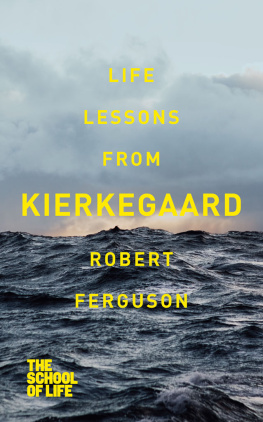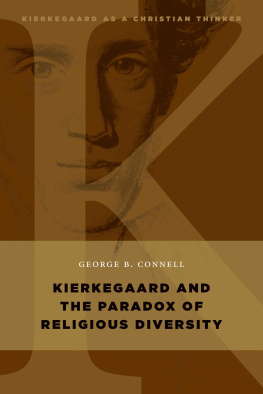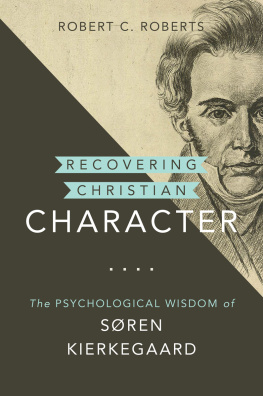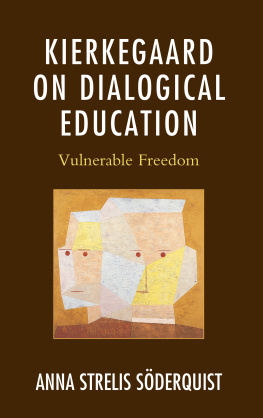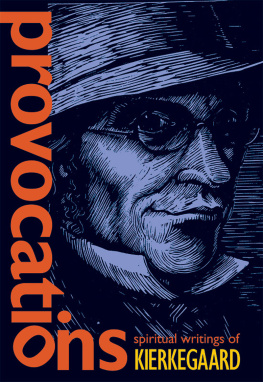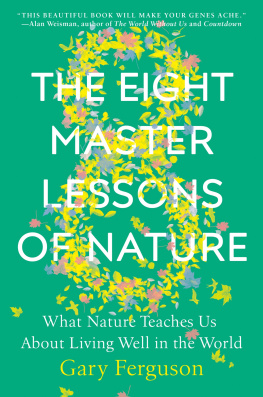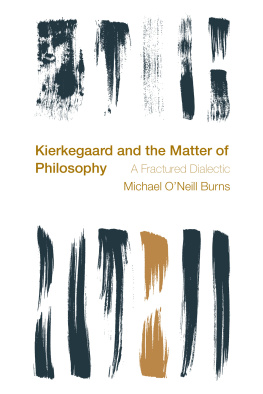Ferguson Robert - Life lessons from Kierkegaard
Here you can read online Ferguson Robert - Life lessons from Kierkegaard full text of the book (entire story) in english for free. Download pdf and epub, get meaning, cover and reviews about this ebook. year: 2013, publisher: Macmillan, genre: Romance novel. Description of the work, (preface) as well as reviews are available. Best literature library LitArk.com created for fans of good reading and offers a wide selection of genres:
Romance novel
Science fiction
Adventure
Detective
Science
History
Home and family
Prose
Art
Politics
Computer
Non-fiction
Religion
Business
Children
Humor
Choose a favorite category and find really read worthwhile books. Enjoy immersion in the world of imagination, feel the emotions of the characters or learn something new for yourself, make an fascinating discovery.
- Book:Life lessons from Kierkegaard
- Author:
- Publisher:Macmillan
- Genre:
- Year:2013
- Rating:4 / 5
- Favourites:Add to favourites
- Your mark:
- 80
- 1
- 2
- 3
- 4
- 5
Life lessons from Kierkegaard: summary, description and annotation
We offer to read an annotation, description, summary or preface (depends on what the author of the book "Life lessons from Kierkegaard" wrote himself). If you haven't found the necessary information about the book — write in the comments, we will try to find it.
Life lessons from Kierkegaard — read online for free the complete book (whole text) full work
Below is the text of the book, divided by pages. System saving the place of the last page read, allows you to conveniently read the book "Life lessons from Kierkegaard" online for free, without having to search again every time where you left off. Put a bookmark, and you can go to the page where you finished reading at any time.
Font size:
Interval:
Bookmark:


I had known of Kierkegaard for some twenty years before his thinking began to interest me personally. What really set me off was something I came across in researching for a biography I was writing of the Norwegian dramatist Henrik Ibsen. In the course of my reading I came across suggestions that in Brand, his great breakthrough play about a priest, Ibsen had been conducting a full-scale dramatic examination of how the philosophers idea of a life lived in the service of an idea might play out in practice. Ibsen claimed to have read little of Kierkegaard and to have understood even less; but Kierkegaards ideas created the intellectual climate in Scandinavia into which Ibsen was born, so it was hardly necessary for the playwright to have read his work to be nevertheless completely familiar with his thinking.
As I began to read Kierkegaard I soon realized that he had lived such a life himself, in the intense, disturbing and passionate pursuit of a single idea. It also became increasingly clear to me that he was actually one of the greatest confessional writers I had ever come across. One specific aphorism stands out from that time, an almost laconic observation to the effect that life can only be understood backwards but must be lived forwards. I still think of it every time I sit facing the wrong way on a train. For the first time in my life I felt I understood who the great philosophers were, and why they mattered: they were people who tried to make sense of their own lives and who, in doing so, tried to help us make sense of ours.
Sren Kierkegaard was a Dane, born in 1813, the youngest of a family of seven children. Before he reached the age of twenty-two all but he and one older brother had died. Two of his sisters had died in childbirth at the age of thirty-three and Kierkegaard was convinced that he would last no longer than that himself. A friend recalled him saying that henceforth he was going to read only writings by men who have been executed. He had laughed, thinking it a typical example of the young Kierkegaards sense of humour. Later he realized he was being invited to a discussion on the subject of death and regretted not accepting the invitation. His profound experience of the brevity of life led Kierkegaard to think of living as a preparation for death, and in its turn this awareness gave him a driven sense of the value of time. In fifteen years of active literary life his output was prodigious. On a single day in 1843 he published three books. Each line is haunted by the same urgent whisper: every moment matters.
Srens father Michael was from the lowest peasant class. In 1777, at the age of twenty-one, he was released from service by his master and within a short space of time had made a fortune as an importer of textiles. By the time he was forty he was rich enough to retire. Sren was born when he was fifty-six, the child of his second marriage to Ane, his former housekeeper. Michael Kierkegaard was a deeply religious man. There is a story that as a boy of fourteen, out tending his masters sheep, he had cursed God for the unfairness of his fate, and the subsequent dramatic change in his fortunes following the outburst seems to have haunted him with guilt. He instructed Sren in a dark vision of Christianity that Sren resented for a long time, feeling he had had no real childhood at all. Later he learned to see the legacy as a chance to reinvent his own idea of what being a Christian really meant. With his fathers death in 1838 Sren inherited a fortune that relieved him of the need to earn a living and enabled him to start in earnest on what he had decided would be his lifes work: as a thinker and writer.
At the heart of Kierkegaards life and thought lies a most remarkable love story. In May 1837, at the house of a Copenhagen friend, he met and subsequently pursued the precocious and talented Regine Olsen. In 1840, when she was eighteen years old, he proposed to her and was accepted. In September 1841 he broke off the engagement, and shortly afterwards published the book that made him famous throughout Scandinavia and that is probably still the title most commonly associated with his name, Either/Or.
Like almost all the products of Kierkegaards prodigious literary activity, Either/Or was published under a pseudonym. Written in a variety of contrasting voices and styles, the books most famous or notorious section is A Seducers Diary, an account by a young man named Johannes of the incredible lengths he goes to in order to win the love of a young woman. Success, as it turns out, is the object of the whole exercise; having won her heart he then ends the relationship, leaving himself free to seek out another target for his diverting campaign of conquest.
Just exactly why Kierkegaard broke with Regine is one of the great enigmas of his life. It is clear from his subsequent writing, and particularly the Journals and Papers, that he continued to love her, so much so that on his death in 1855 he bequeathed what small amount of money he had left to her, explaining that he did so because he regarded their engagement as being the same as a marriage. She, however, had long since married someone else and the bequest was declined.
In Either/Or Kierkegaard presents his readers with a division of life into three stages on lifes way (actually four, though the first is never referred to as a stage), each constituting an advance on the one before it: the philistine, the aesthetic, the ethical and the religious. Though he used pseudonyms to write in the voices of people at all of these stages (showing a notable affinity with those at the aesthetic stage), in his own view he was always a religious writer, concerned to persuade his readers of their absolute need to take the philistineaestheticethicalreligious path to Christ. His commitment to something as irrational as Christianity has led many philosophers to dismiss him as not a proper philosopher at all, and he was well aware that many found his position intellectually dubious. Yet one of the most stimulating paradoxes about Kierkegaard is that, with all his love of Christ, his was also one of the most rational, intellectual, analytically precise and psychologically acute minds most of us are ever likely to encounter. For me, reading him is like going on a long walk in the company of a fascinating companion. Much of what he says is too abstruse and complicated, even too personal, for me to understand; much, much more of it is enlightening, profound, thought-provoking and enriching. As an agnostic I cannot follow Kierkegaard all the way to the gates of the heaven he sees so clearly in front of him, and we always part company before he reaches his final destination. But from my point of view at least, it is far more fun to travel interestingly than to arrive.
One of the ideas most commonly associated with Kierkegaard is that a leap of faith is required in order to understand and accept the shattering significance of the New Testament story and the assertion of the divinity of Christ. Again, it is difficult to know whether one has understood exactly what he meant by this, but it seems to me that he is referring to the idea that a rational approach to knowledge will always, in the end, come up against limits, but that a thousand subjective impulses continue to whisper to us that these limits are not the end at all. And is his idea of the leap of faith really so strikingly irrational? Every child, on first hearing that the universe began in a Big Bang, immediately wants to know what came before that?
Next pageFont size:
Interval:
Bookmark:
Similar books «Life lessons from Kierkegaard»
Look at similar books to Life lessons from Kierkegaard. We have selected literature similar in name and meaning in the hope of providing readers with more options to find new, interesting, not yet read works.
Discussion, reviews of the book Life lessons from Kierkegaard and just readers' own opinions. Leave your comments, write what you think about the work, its meaning or the main characters. Specify what exactly you liked and what you didn't like, and why you think so.

